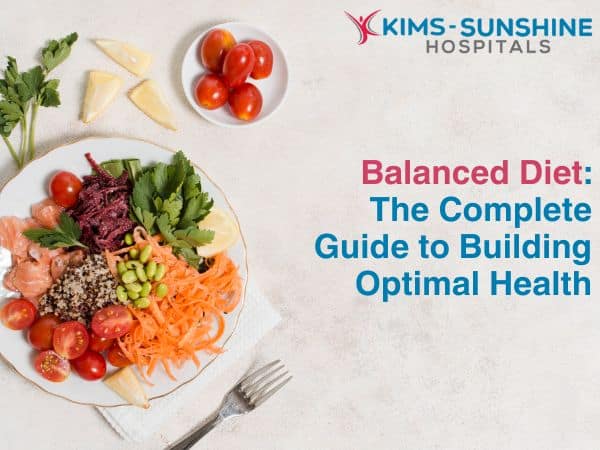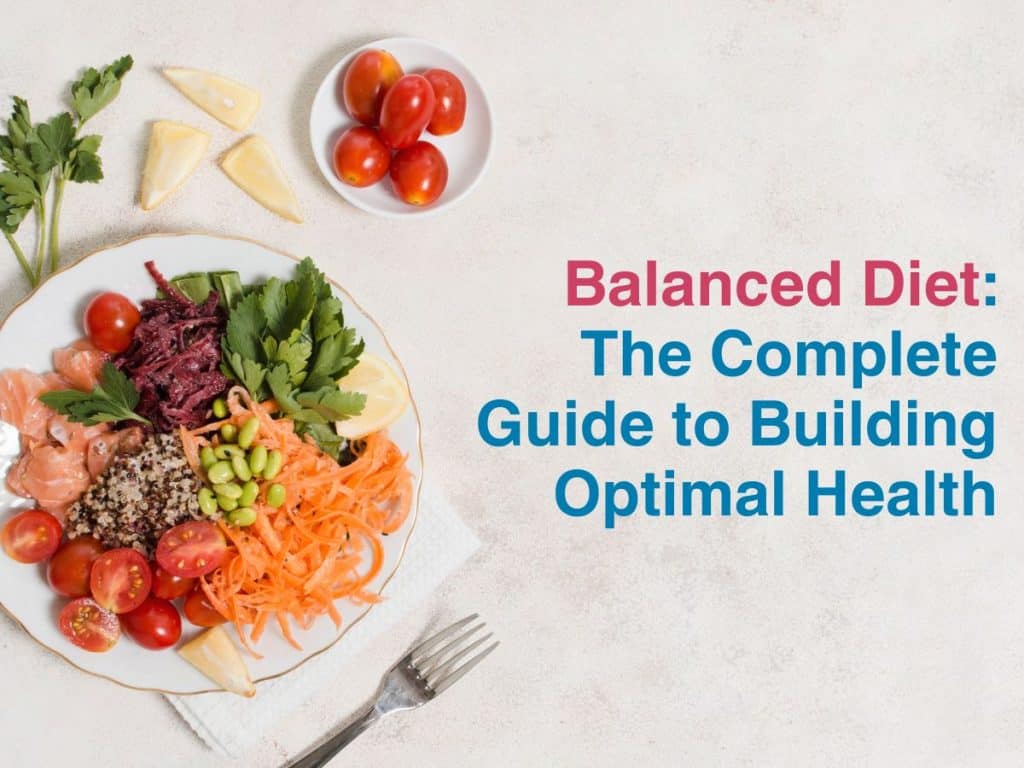
Understanding the Basics of a Balanced Diet: The Complete Guide to Building Optimal Health
 Is it no secret that what you put on your plate impacts your health.
Is it no secret that what you put on your plate impacts your health.
While the Western World is still playing catch-up when addressing the importance of nutrition in maintaining optimal health, the Indian civilization recognized its significance centuries ago proof of this can be found in several Ayurveda texts and works of the Rishi’s like Apastamba.
A balanced diet comes naturally to most Indians.
But, like most Ancient knowledge, the importance of food and nutrition is also lost on us and many of us turn to trusty-old Swiggy and Zomato to fulfill nutritional requirements.
Quick tweaks in lifestyle and a fundamental understanding of a Balanced Diet can help us gain the vitality, energy, and good health we need and deserve.
Eating a balanced diet packed with essential nutrients is key for maintaining energy levels, supporting biological processes, and preventing chronic diseases.
Understanding what constitutes a balanced diet can be confusing with all the contradictory nutrition advice.
This guide will provide a comprehensive overview so you can eat with confidence.
The Essential Nutrient Players
Let’s begin with the building blocks, the foundation if you will!
Just like a building needs a strong foundation that is built with bricks, concrete, water, and so on, a balanced diet incorporates the right mix of six core nutrients that work together to enable the body’s functions:
Proteins – The building blocks of bones, muscles, cartilage, skin, blood, and enzymes that drive biochemical reactions. Animal products like meat, poultry, fish, eggs, and dairy provide complete proteins with all nine essential amino acids the body cannot produce unassisted.
Carbohydrates – The body’s preferred source of energy derived from food sources like whole grains, fruits, vegetables, and dairy products. Fiber from complex carbs promotes digestive and heart health.
Fats – Critical for vitamin absorption, energy storage, and proper cell function/growth. Focus on healthy unsaturated fats from fish, nuts, seeds, avocados, and olive/canola oils.
Vitamins – Organic compounds like vitamins A, B, C, D, E, and K that regulate processes like metabolism, digestion, nerve transmission, bone development, and blood clotting.
Minerals – Inorganic nutrients like iron, calcium, potassium, and zinc that enable functions like oxygen transport, bone density, fluid balance, and muscle contractions.
Water – Essential for digestion, joint lubrication, temperature regulation, detoxification, and nutrient absorption and transportation.
Creating a Balanced Plate
Now that you understand the key nutrient players, how can you incorporate them into a cohesive, balanced diet?
Aim to make every meal a mix of the following food groups:
Fruits and Veggies – Packed with fiber, vitamins, minerals, and protective antioxidants, these plant foods should make up half your plate. Variety is key, so mix up colors and types.
Whole Grains – Opt for fiber-rich, minimally processed options like quinoa, brown rice, oats, and 100% whole wheat. They provide sustained energy and help regulate digestion.
Lean Proteins – Choose from poultry, fish, eggs, low-fat dairy, beans/lentils, nuts/seeds and edamame for a muscle-building, satisfying dose of protein.
Healthy Fats – Don’t fear fats! Just make smart choices like olive oil, avocados, nuts/seeds, and fatty fish packed with omega-3s that protect the brain and heart.
Low-Fat Dairy – Including milk, yogurt, and cheese provides calcium, vitamin D, and protein. Go for unsweetened dairy or dairy alternatives like fortified plant milks.
Real-Life Tips for Balanced Living
Implementing a balanced diet doesn’t require drastic measures.
Start with these simple tips:
• Cook at home more often using basic, wholesome ingredients
• Read nutrition labels and limit added sugars, sodium, and saturated/trans fats
• Stay hydrated by sipping water regularly
• Practice portion control with proper serving sizes
• Make half your grains 100% whole grains
• Vary protein choices to take advantage of different nutrients
Meal Prepping Made Easy
One of the best ways to stick to a balanced diet is by meal prepping nutrient-dense dishes in advance.
Here are some tasty, balanced recipes to get you started:
Vegetable Biryani with Basmati Rice and Paneer
Chana Masala with Roti and Salad
Grilled Tandoori Chicken with Roasted Cauliflower
Red Lentil Dal with Steamed Greens and Rice
Chickpea and Vegetable Masala Stuffed Peppers with Rice/Roti
Slow Cooker Chicken Curry with Sweet Potatoes and Peas
High-protein Rajma (Kidney Bean Curry) with Brown Rice
Cod Fish Curry with Okra and Steamed Basmati Rice
The great thing about Indian cuisine is that it naturally incorporates a variety of nutrient-dense ingredients like lentils, vegetables, yogurt, spices, and herbs.
Many dishes can easily be made vegetarian or with proteins like tofu, paneer, and lentils. Prep a few servings of curries, dals, or biryanis with sides of whole grains and you have balanced, flavorful meals for days. Incorporate cooling elements like raita, chutneys, or lassis too!
Busting Common Balanced Diet Myths
With so much misinformation, it’s easy to be misled about balanced diets. Here are some common myths busted:
Myth: Healthy food is bland and boring.
Truth: With limitless wholesome ingredients, balanced meals can be incredibly tasty, satisfying, and creative.
Myth: Following a balanced diet is expensive.
Truth: Staples like grains, beans, vegetables, fruits, eggs, and fish are very affordable.
Myth: Counting calories or macros is mandatory.
Truth: Simply focus on balanced portions from each food group covering all nutrients.
Myth: A balanced diet lacks variety and freedom.
Truth: There’s room for all foods in balance – even treats in moderation!
The Power of a Balanced Diet
By understanding the basics of a balanced diet and working towards incorporating a variety of nutrient-dense foods, you can reap immense benefits:
• Increased energy levels and mental clarity
• Improved digestion and nutrient absorption
• Healthy weight management and metabolism
• Reduced risk of chronic conditions like heart disease, diabetes, and cancers
• Strengthened immune system
• Glowing skin, strong nails and robust hair
• Better sleep and mood regulation
Conclusion
Your body truly is fueled by the foods you eat, so why not give it the very best? Getting back to the basics with a balanced diet is one of the greatest investments you can make in your overall health and quality of life.
If you need help with incorporating more nutritious meals and find the right meal plan for you, you could visit a nutritionist.






